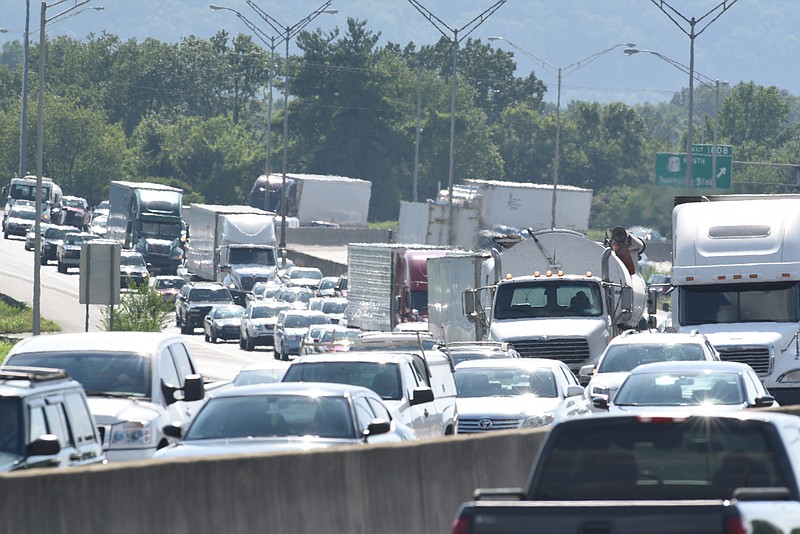Our governor is pushing for what some lawmakers expect will be 9-cent increase in the gas tax and a 12-cent boost on Tennessee's diesel tax.
The amounts aren't certain because Republican Gov. Bill Haslam is still privately shopping the idea among members of the GOP-majority legislature.
Last week Haslam told reporters he knows he must find the "comfort level" that balances state and local transportation needs with increases lawmakers and consumers can accept.
"We obviously have to do something that can get passed," the Republican governor said. "I think everybody agrees we have to do something. The question now is what."
He's right. Road repair isn't sexy. And orange barrels certainly are not exciting.
But neither are potholes. Or interstates that feel as though they are corrugated. Grid-locked, two-lane chokes are no fun either.
And right now, being on Tennessee highways increasingly feels like being put in a very uncomfortable time-out.
Tennessee's gas tax, created in 1924 solely to pay for roads, is now 21.4 cents per gallon while diesel is 18.4 cents per gallon. There has been no increase since 1989 - 27 years ago. But in that same time period higher vehicle fuel efficiency combined with higher costs to build and maintain roads have put the state's interstates and roads, along with local transportation, far behind in funding.
The state currently has a $6 billion - with a "b" - backlog in previously approved transportation projects that will take years to complete. Gov. Haslam, who began talking about the need for fuel tax increases in 2015, says there are more billions in projects awaiting approval.
Today, each penny in the gas tax raises $30.7 million for the state and local governments. Each penny of the diesel tax raises $10.1 million.
For context, the rebuild of U.S. Highway 27 through downtown Chattanooga is expected to tally $125 million, the Tennessee Department of Transportation's most expensive project ever.
A 9-cent increase would generate $276.3 million annually, while 12 cents more on diesel would bring in $121.2 million for a combined $397.5 million in new revenue.
So when the 110th General Assembly begins today, the fuel tax increase will be on the long-term agenda, along with expected pushes for school bus seat belts, Sunday wine and liquor sales, medical marijuana legalization and school vouchers. Just don't expect action right away. That likely won't come until at least February - after Haslam's Jan. 30 State-of-the-State address.
Meanwhile, however, the state has an estimated $1 billion surplus - mostly from the state's sales tax and franchise and excise taxes on businesses.
That complicates matters for the governor as he tries to peddle his fuel tax increase plan. Taxpayers say - and understandably so - hey, wait a minute, you want to raise taxes but we have this surplus .
But the sales and excise taxes are used for K-12 and higher education, health care, housing felons, building prisons and building hospitals and group homes for the mentally ill and disabled Tennesseans. And surely no one thinks Tennessee schools need less funding.
Haslam said the one-time surplus revenues "are just that" - one-time surpluses, "and [we] can't build a road program off non-recurring dollars."
Add to that complication the fact that lawmakers already are busy skirmishing over how to cut taxes in other areas because of the projected general fund surplus, along with an expected increase of $845 million in recurring money.
Lawmakers last year voted to phase out the Hall income tax, which is shared with cities and counties. That's a loss of about $275 million.
Sen. Randy McNally, R-Oak Ridge, who is expected to be elected Senate speaker, says lawmakers must be careful not to over-commit the state to revenue cuts it cannot afford.
McNally served for the past decade as Senate Finance Committee chairman. He says Tennessee sales taxes and corporate taxes grew more quickly than expected in two budget years, helping fuel the surplus, but sales tax growth rates are slowing. He reminds us that our state is heavily sales tax-dependent, and it took years for the sales tax funding to recover after the 2008 recession struck.
For now, the Tennessee Department of Transportation's total state revenue is $844.5 million, according to the TDOT website, and, according to legislative documents, that includes vehicle registration taxes and some other levies.
A Vanderbilt University poll of Tennessee registered voters found that 55 percent said they could accept an 8-cent gas tax increase.
Apparently that seems preferable to our longer and longer waits in the parking lots we know as I-75 and I-24.
